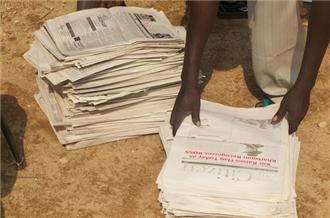S. Sudan security confiscates newspaper over opposition coverage
December 16, 2014 (JUBA) – South Sudanese government operatives have carried out a raid on a distribution centre handling several of the country’s leading national newspapers, seizing copies and threatening to close one down, multiple reporters and management said Tuesday.

“They said we carried in our front page the picture of Riek Machar, which gives him prominence over the president,” Atak told Sudan Tribune in an exclusive interview on Tuesday.
He said some 25000 copies were confiscated in the raid, which took place at about 6am (local time) on Tuesday.
Atak maintained the paper had done nothing wrong nor covered any controversial issues to warrant the seizure of its papers or security threats to close it down.
“There was nothing wrong we did. The picture of the president was also on the front page,” he said, adding that he feared the paper may now be shut down completely as a result.
“All copies were seized and we are not sure whether it would be allowed to return to circulation because it remains closed until now,”
“There are no indications that we will come out tomorrow (Wednesday). They (security agents) have threatened to close down completely the paper, which is a clear breach of press freedom,” he added.
According to Atak, the confiscation of the paper represents a huge financial loss to the organisation in the form of printing and other administrative costs.
Nhial Bol Aken, editor-in-chief of The Citizen, another independent daily newspaper, said the actions of security agents go against the transitional constitution that the government is supposed to protect and promote.
“We call on those who have done this to accept and respect the vital role that media play in circulating information and educating the members of the general public,” said Aken.
“Media are helping the government in the communication and dissemination of its policies and programs,” he added.
South Sudan has one of the world’s worst track records when it comes to press freedom, with journalist routinely subject to arbitrary arrest and detention since the country gained its independence from neighbouring Sudan in 2011.
Ranked 119th out of 180 countries in the 2014 Reporters Without Borders press freedom index, South Sudanese authorities have been accused of a string of media freedom violations despite being the world’s newest country.
In recent months the government has targeted Catholic Church-run community radio stations, with Juba-based Radio Bakhita, which is run by the Juba archdiocese, forced off air in August for broadcasting a report about clashes in Unity state capital Bentiu. It has since been allowed to resume broadcasting on condition that it refrains from talking about politics.
Last month, Nyuon Ruac a former reporter for the bi-monthly New Nation newspaper, was allegedly interrogated and beaten by security forces while being held in an unknown location in the capital, Juba, after returning form Kenya.
(ST)
